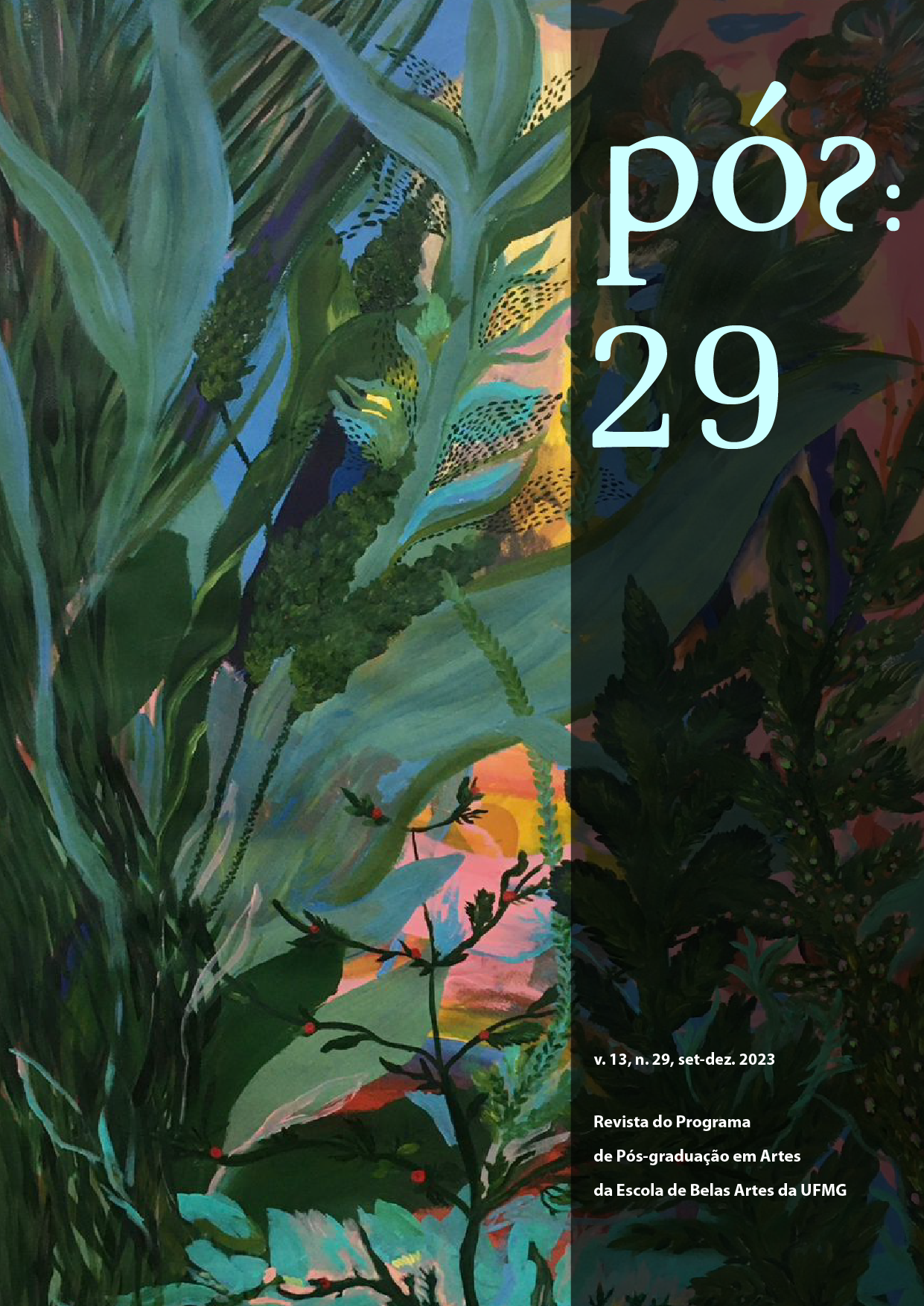Under the shadow of Saint Teresa of Ávila
Iconography of Saint John of the Cross in the Portuguese Panels in the Church of the Third Order of Carmel of Recife (XVIII Century)
DOI:
https://doi.org/10.35699/2238-2046.2023.46720Keywords:
Carmelits , Third Order, Iconography, Saint John of the Cross, TilesAbstract
The paper aims to analyze the iconography of two Portuguese tile panels found in theaccess hall to the sacristy of the church of the Carmelite Third Order of Recife which containrepresentations of Saint John of the Cross. As imported goods from the kingdom, tiles werehigh valued in the market. Therefore, its acquisition in Portuguese America was made bywealthy orders and fraternities, becoming symbolic elements of power inside the salvationeconomy. The fabrication process was made from afar, leaving the ordered to decide onthe theme and place after receiving the commission. Without the interference of theCarmelites Third in the process of construction of the imagetic composition, theiconography of those panels took separate paths from the engravements that served asbase, building new iconography types. Through a comparative method based on the ErwinPanofsky iconology, the article analyses the imagetic theme of those panels, the presenceof Saint John of the cross, and the placing of the tiles in a space of less artistic fruition
References
ANUNCIACIÓN, Gaspar de. Representación de la vida del bien aventurado P. F. Juan de la Cruz, Primer Carmelita Descalzo. Bruxas: Pedro Van Pée, 1678.
BARATA, Mario. Azulejos no Brasil: séculos XVII, XVIII e XIX. Rio de Janeiro: Jornal do Commercio, 1955.
BASTOS, Rodrigo. A maravilhosa fábrica de virtudes: o decoro na arquitetura religiosa de Vila Rica, Minas Gerais (1711-1822). São Paulo: Edusp, 2013.
BOHRER, Alex. Os missais de Platin e outras reminiscências flamengas no Barroco mineiro. In: THOMAS, Werner et al. (org.). Um mundo sobre papel: livros, gravuras e impressos flamengos nos Impérios português e espanhol (Séculos XVI-XVII). São Paulo: Edusp; Belo Horizonte: Editora UFMG, 2014. p. 475-494.
CARRETERO, Ismael Martinez. Los carmelitas: historia de la orden del Carmen. Las figuras del Carmelo. Madrid: Biblioteca de Autores Cristianos, 1996.
CHEVALIER, Jean; GHEERBRANT, Alain. Dicionário de símbolos. Rio de Janeiro: José Olympio, 1992.
COLLAERT, Adriaen; GALLE, Cornelis. Vita B. Virginis Teresiæ a Iesu Ordinis Carmelitarum Excalceatorum Piae Restauratricis. Illustrissimo Domino D. Roderico Lasso Niño. Comiti de Añover. Serenissimi Archiducis Alberti Œconomo supremo &ca. Dicata. Antwerp: Adrianum Collardum et Cornelium Galleum, 1613. Disponível em: https://archive.org/details/wotb_8862177/page/n5/mode/2up?view=theater. Acesso em: 1 nov. 2022.
CUADRO, Fernando Moreno. Iconografía de Santa Teresa: las series grabadas. Burgos: Editorial Monte Carmelo, 2017.
GALÃO. Dicionário Priberam da Língua Portuguesa. Disponível em: https://dicionario.priberam.org/gal%C3%A3o. Acesso em: 3 mar. 2023.
HANSEN, João Adolfo. Barroco, neobarroco e outras ruínas. Teresa, v. 2, 2001. Disponível em: https://www.revistas.usp.br/teresa/article/view/116560. Acesso em: 20 dez. 2022.
HONOR, André Cabral. Origem e expansão no mundo luso da observância de Rennes: a mística-militante dos carmelitas turônicos ou reformados no século XVII e XVIII. Clio – Revista de Pesquisa Histórica, Recife, v. 32, n. 1, 2014. Disponível em: https://periodicos.ufpe.br/revistas/revistaclio/article/view/24469/19776. Acesso em: 20 out. 2023.
HONOR, André Cabral. A pinacoteca dos irmãos terceiros carmelitas do Recife na Capitania de Pernambuco: revisitando a pintura de Manoel de Cláudio Francisco da Encarnação (séc. XIX). Territórios e Fronteiras (UFMT. Online), v. 10, n. 1, p. 179-200, 2017. Disponível em: https://periodicoscientificos.ufmt.br/territoriosefronteiras/index.php/v03n02/article/view/522/pdf. Acesso em: 15 abr. 2023.
HONOR, André Cabral. Santa Teresa e os fundadores: iconologia da pintura de João de Deus e Sepúlveda na Igreja da Ordem Terceira Carmelita do Recife (Séc. XVIII). Tempo, Niterói, v. 25, n. 3, p. 555-576, set./dez. 2019. Disponível em: http://www.scielo.br/pdf/tem/v25n3/1980-542X-tem-25-03-555.pdf. Acesso em: 21 abr. 2022.
HONOR, André Cabral. Livros, gravuras e pinturas na Igreja da Ordem Terceira Carmelita do Recife: apropriações e usos das imagens sacras na América portuguesa. Estudos Ibero-Americanos, Porto Alegre, v. 47, n. 2, p. 1-14, maio/ago. 2021. Disponível em: https://doi.org/10.15448/1980-864X.2021.2.35297. Acesso em: 5 dez. 2022.
HONOR, André Cabral. A miniatura na arte sacra tridentina no Império Português: os casos de Josefa de Óbidos e João de Deus e Sepúlveda. História (São Paulo), v. 41, p. 1-18, 2022. Disponível em: https://doi.org/10.1590/1980-4369e2022021. Acesso em: 6 dez. 2022.
KITSOM, Michael. O Barroco. Rio de Janeiro: Expressão e Cultura, 1979.
LURKER, Manfred. Dicionário de figuras e símbolos bíblicos. São Paulo: Paulus, 2006.
MARINHO, Lucia Maria Rodrigues. Santa Teresa de Jesus na azulejaria e pintura no século XVIII. 2018. 678 p. Tese (Doutorado em História) – Universidade de Lisboa, Lisboa, 2018.
MELLO, Evaldo Cabral. A fronda dos mazombos: nobres contra mascates, Pernambuco, 1666-1715. São Paulo: Editora 34, 2003.
MUELA, Juan Carmona. Iconografía de los santos. Madrid: Akal, 2009.
ORAZEM, Roberta Bacellar; CAMPOS, Maria de Fátima Hanaque. Imagens da contrarreforma espanhola no Brasil: a vida de São João da Cruz na Igreja da Ordem Terceira do Carmo de Cachoeira, Bahia. Domínios da Imagem, Londrina, ano IV, n. 8, p. 89-104, maio 2011. Disponível em: file:///D:/Arquivos%20do%20computador/Artigos/Artigos%202022/Azulejos/dominiosdaimagem,+Gerente+da+revista,+8-Orazem.pdf. Acesso em: 10 out. 2023.
PANOFSKY, Erwin. Significado das artes visuais. Tradução: Maria Clara F. Kneese e J. Guinsburg. São Paulo: Perspectiva, 2007.
PIO, Fernando. Histórico da Igreja de Santa Thereza ou Igreja da Ordem Terceira de Nossa Senhora do Monte do Carmo da cidade do Recife. Recife: Jornal do Commercio, 1937.
QUEIROZ, Rafael Lima Meireles de. A voz de Deus: o toque dos sinos como objeto de negociação entre os membros da Ordem Primeira e da Ordem Terceira do Carmo do Recife setecentista. 2021. 129 f. Dissertação (Mestrado em História) – Universidade de Brasília, Brasília, 2021.
REVILLA, Federico. Diccionario de iconografía y simbología. 11. ed. Madrid: Cátedra, 2021.
SALDANHA, Sandra Costa. Fontes para a iconografia teresiana no convento do Santíssimo Coração de Jesus à Estrela. Cultura [Online], v. 21, p. 101-126, 2005. Disponível em: http://journals.openedition.org/cultura/3041. Acesso em: 28 jul. 2022.
SILVEIRA, Patrícia Ferreira dos Santos. Excomunhão e economia da salvação: queixas, querelas e denúncias no tribunal eclesiástico de Minas Gerais do século XVIII. São Paulo: Alameda, 2015.
SIMÕES, João Miguel Santos. Azulejaria em Portugal no século XVIII. Lisboa: Fundação Calouste Gulbenkian, 1979.
SIMÕES, João Miguel Santos. Azulejaria portuguesa no Brasil. Lisboa: Fundação Calouste Gulbenkian, 1965.
SIMÕES, João Miguel Santos. Estudos de azulejaria. Lisboa: Imprensa Nacional, 2001.
SOBRAL, Luis de Moura. Do sentido das imagens: ensaios sobre pintura barroca portuguesa e outros temas ibéricos. Lisboa: Estampa, 1996.
STEGGINK, Otger. Antonio de Jesús Heredia. Disponível em: https://dbe.rah.es/biografias/42820/antonio-de-jesus-heredia. Acesso em: 10 dez. 2022.
VILLAMENA, Francisco. Beata Virgo Theresia De Iesu Fratrum Carmelitarum Discalceatorum Monialiumq. Fundatrix, 1614. Gravura avulsa.
Downloads
Published
Versions
- 2024-05-09 (4)
- 2024-05-09 (3)
- 2024-03-27 (2)
- 2023-12-18 (1)
How to Cite
Issue
Section
License
Copyright (c) 2023 André Cabral Honor

This work is licensed under a Creative Commons Attribution-NonCommercial 4.0 International License.
Authors who publish in this journal agree to the following terms:
- Authors retain copyright and grant the journal the right of first publication, with the work simultaneously licensed under the a Creative Commons Attribution-NonCommercial 4.0 International License that permits sharing of the work with acknowledgement of authorship and initial publication in this journal;
- Authors are permitted to enter into additional contracts separately, for non-exclusive distribution of the version of the work published in this journal (e.g., the Creative Commons Attribution License).
- Authors are permitted and encouraged to publish and distribute their work online (e.g., in institutional repositories or on their home page) at any point before or during the editorial process, as this may generate productive changes as well as increase the impact and citation of the published work.
- It is the responsibility of the authors to obtain written permission to use in their articles materials protected by copyright law. Revista PÓS is not responsible for copyright breaches made by its contributors.












